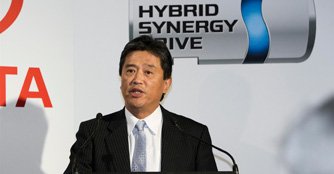Toyota to cease production in Australia by 2017
14 Feb 2014|3,469 views
Toyota follows in the footsteps of Ford, and will cease all manufacturing activities in Australia by the end of 2017 - including the local manufacturing of the Camry, Camry Hybrid and Aurion models along with the production of four-cylinder engines.

Also Australia is one of the most open and fragmented automotive markets in the world and increased competitiveness due to current and future Free Trade Agreements, has led Toyota to believe it is not viable to continue building cars in Australia.
"This is devastating news for all of our employees who have dedicated their lives to the company during the past 50 years. While we have been undertaking the enormous task of transforming our business during the past two years, our people have joined us on the same journey, which makes it even more difficult to announce this decision. Although the company has made profits in the past, our manufacturing operations have continued to be loss making despite our best efforts," explained Mr.Yasuda.
Mr.Yasuda went on to explain the focus will be to work with employees, suppliers, government and the unions as Toyota transitions to a national sales and distribution company. Approximately 2,500 employees directly involved with manufacturing will be impacted when the plant stops building cars in 2017.
Mr.Yasuda said Toyota was committed to providing support to the industry as it prepares for the end of vehicle manufacturing in Australia. The firm will continue to be involved in its local communities and employ thousands of people both directly and indirectly via its extensive dealership network.
Beyond 2017, the automaker will import the Camry and Aurion models along with the entire range of Toyota passenger and commercial vehicles.
Toyota follows in the footsteps of Ford, and will cease all manufacturing activities in Australia by the end of 2017 - including the local manufacturing of the Camry, Camry Hybrid and Aurion models along with the production of four-cylinder engines.
Market and economic factors contributing to the decision include unfavourable Australian dollar that makes exports unviable, high costs of manufacturing and low economies of scale for vehicle production and local supplier base.
Also Australia is one of the most open and fragmented automotive markets in the world and increased competitiveness due to current and future Free Trade Agreements, has led Toyota to believe it is not viable to continue building cars in Australia.
"This is devastating news for all of our employees who have dedicated their lives to the company during the past 50 years. While we have been undertaking the enormous task of transforming our business during the past two years, our people have joined us on the same journey, which makes it even more difficult to announce this decision. Although the company has made profits in the past, our manufacturing operations have continued to be loss making despite our best efforts," explained Mr.Yasuda.
Mr.Yasuda went on to explain the focus will be to work with employees, suppliers, government and the unions as Toyota transitions to a national sales and distribution company. Approximately 2,500 employees directly involved with manufacturing will be impacted when the plant stops building cars in 2017.
Mr.Yasuda said Toyota was committed to providing support to the industry as it prepares for the end of vehicle manufacturing in Australia. The firm will continue to be involved in its local communities and employ thousands of people both directly and indirectly via its extensive dealership network.
Beyond 2017, the automaker will import the Camry and Aurion models along with the entire range of Toyota passenger and commercial vehicles.
Market and economic factors contributing to the decision include unfavourable Australian dollar that makes exports unviable, high costs of manufacturing and low economies of scale for vehicle production and local supplier base.
Also Australia is one of the most open and fragmented automotive markets in the world and increased competitiveness due to current and future Free Trade Agreements, has led Toyota to believe it is not viable to continue building cars in Australia.
"This is devastating news for all of our employees who have dedicated their lives to the company during the past 50 years. While we have been undertaking the enormous task of transforming our business during the past two years, our people have joined us on the same journey, which makes it even more difficult to announce this decision. Although the company has made profits in the past, our manufacturing operations have continued to be loss making despite our best efforts," explained Mr.Yasuda.
Mr.Yasuda went on to explain the focus will be to work with employees, suppliers, government and the unions as Toyota transitions to a national sales and distribution company. Approximately 2,500 employees directly involved with manufacturing will be impacted when the plant stops building cars in 2017.
Mr.Yasuda said Toyota was committed to providing support to the industry as it prepares for the end of vehicle manufacturing in Australia. The firm will continue to be involved in its local communities and employ thousands of people both directly and indirectly via its extensive dealership network.
Beyond 2017, the automaker will import the Camry and Aurion models along with the entire range of Toyota passenger and commercial vehicles.
Latest COE Prices
September 2025 | 2nd BIDDING
NEXT TENDER: 08 Oct 2025
CAT A$119,003
CAT B$136,890
CAT C$72,501
CAT E$140,502
View Full Results Thank You For Your Subscription.


















